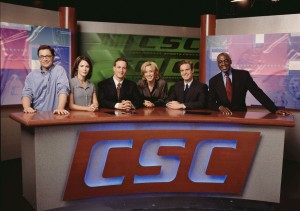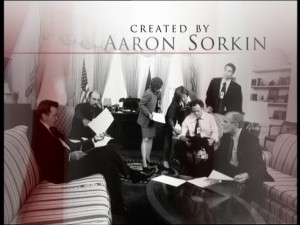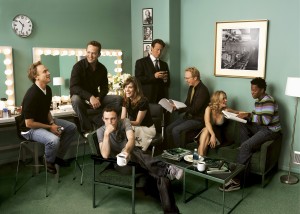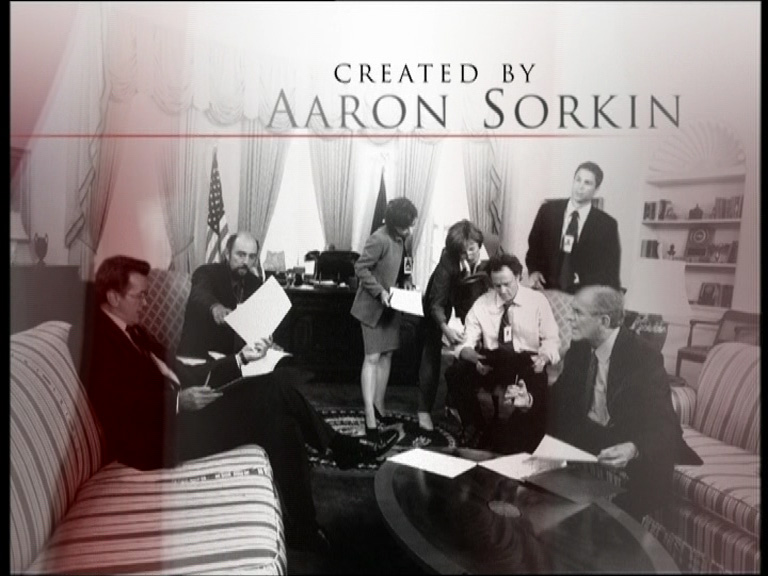Aaron Sorkin is writing a new show, for HBO. Read all about right here (from TV Guide’s Scott Huver). This has me excited in a way that I haven’t felt about an upcoming TV show, since the production of Studio 60 was announced in early 2006. Not to mention that I think Sorkin could really shine on HBO, where language and subject matter won’t necessarily be hindered by the sanitized restrictions of “safe harbor” programming. No date or even a rumor of an ETA has been announced for the premiere, but rest assured I’ll be among the many who tune it to see the next chapter of Sorkin’s career unfold.
Now, for those of you who’re new to my blog, you may not understand the full weigh of my love for anything that Aaron Sorkin writes. I was a fan before I realized I was a fan of his work, when I watched A Few Good Men for the first time and realized that someone finally made Tom Cruise sound human. Shortly after, I watched The American President and fell in love with the rapid-fire banter between White House staffers portrayed by Michael J. Fox and David Paymer, not understanding then that both movies were written by the same guy.

Vintage Sorkin: The cast of "Sports Night." From left to right: Joshua Malina, Sabrina Lloyd, Josh Charles, Felicity Huffman, Peter Krause, and Robert Guillaume.
Fast forward to 2000, and my then-girlfriend Abbie was watching a show called Sports Night and religiously recording it off of Comedy Central. Of course, since we were dating, I took an interest in the show and found it to be witty and funny. When I watched the credits for writing, I was wide-eyed and pointed at the screen at the name “Aaron Sorkin.” That’s the guy that wrote the movies I loved so much, and so I started watching it more and more. I was pretty quickly finding myself quoting it randomly (“The length of this conversation has already exceeded my interest in it.”) in online chatter, and that’s the sign when a writer has influenced you so much that you begin taking their words out of its context and using it within your own.
The beauty of Sports Night, to me, wasn’t just the witty banter and the Steadicam shots of ambulatory conversations; it was the depth of the characters being portrayed on the screen. Where some of the sitcoms on television then (and now) tend to angle for the thinly-created no-depth two-dimensional caricatures that spout mindless drivel in an attempt to appeal to the lowest common denominator, Sorkin not only found the direct route to my funny bone, he also managed to make me care about what happens to the characters espousing their pitter-patter of words (and walking a marathon at the same time). You put the whole thing in the middle of a SportsCenter-like setting, and you’ve not only managed to bring me on board through my love of sports, but also for my love of comedy. Folks, this is the perfecta of superb television writing for me.
Unfortunately, Sports Night was only on the air for a couple of seasons. My understanding of its demise at the time was two-fold: First, that the show was considered to be “too smart” for the typical sitcom audience, and second, Sorkin was already balls-deep into writing The West Wing for NBC at the same time. Not that the quality of Sports Night was ever diminished by this fact. I found the second season to be of the same quality of writing as the first, and I’d even put it up against the best episodes of The West Wing. I find that my assertion meets with resistance from the person who introduced me to the program in the first place. Because the second season explored character faults a lot more than the first (Dan’s therapy, Casey and Dana’s inability to connect, Jeremy’s father issues and his eventual break-up with Natalie), the sitcom became slightly less comedy and more dramatic for a prime-time show taking up valuable sitcom time on ABC. And while I personally appreciated the efforts, I think it rubbed people the wrong way.
I loved it. I loved the heartbreak, I loved the gut-wrenching dialogue, I loved the twists and turns into the psyche of Dan Rydell (in spite of the obviously incompetent therapist he was seeing), and I especially loved that after a year’s worth of chasing Dana, Casey figured out that he was more than the sum of his crush on her or the remnants of his failed marriage to Lisa. He was his own man, which was awesome. I loved Sports Night because it was clear that we weren’t going to get exactly what we thought would happen. The predictability was removed from the equation and I found that exceedingly refreshing.

Arguably the best television credit of my generation. The Cast of "The West Wing." From left to right: Martin Sheen, Richard Schiff, Moira Kelly, Allison Janney, Bradley Whitford, Rob Lowe, and the late John Spencer.
Then, of course, Sports Night ended and Sorkin worked full-time on The West Wing.
Admittedly, I didn’t find out about The West Wing until it was well into its fourth season. This had a lot to do with the fact that I wasn’t watching a lot of network television at the time; I literally had my remote glued to the premium cable channels (HBO, Showtime, etc), watching shows like The Larry Sanders Show and the like. I’m trying to remember how it was and when it was I sat down and watched it… I think it was when it began its syndication run on Bravo. Yeah. I remember catching a couple of episodes and finding it very good. I then set a season pass on my TiVo (Man, I miss my TiVo) the next time it cycled back through to the first season. I was keeping whole seasons on my DVR and then watching them all at once. I addicted my roommate and his younger brother, and as soon as we could get a hold of the seasons of DVD, we would hold private viewing parties in our shared living room. One weekend a month, we would spend most of it sitting on the couch and watching our new favorite television show together.
What was great about The West Wing for me, was that it showed a rather idealistic view of government in an age when I think a majority of people (even today) believe that their government sucks. And though I wish that someone like Josiah Bartlet would run for President of the United States, I know that to have such a man make it that far in politics would also mean they would have to compromise on some of their values in order to appeal to the electorate. In a day and age when we were facing down the political gun of a Republican majority in Congress and a Republican-held White House, The West Wing offered an escape for me into the world of an ideal liberal President trying to be a force for the greater good without having to stray too far from the center.
Not to mention, I think the best thing Aaron Sorkin ever did for me was re-ignite my interest in political science. As a result, I’ve tried to live by the tenet that “Decisions are made by those who show up.” I know full well it’s a paraphrase of something Woody Allen said, but the context in which it’s used had a greater impact to me than most anything else on television in my lifetime. So, with that in mind, I joined Obama’s campaign in 2008, and I got involved. To this day, that experience is something I treasure, and I’m looking forward to doing it again for the re-elect in 2012. There was a time when Sorkin had a Facebook community when he was doing massive research for writing “The Social Network” (I think he’s going to win the Oscar this year), and I wrote him a quick note to let him know how much he’d influenced me in getting involved. I never heard back, because the board was essentially a massive outpouring of like-minded fans, and I’m sure my note was lost in the cacophony of voices screaming for his attention. But I wrote it, and I was happy to at least have the opportunity to say something to him. Whether or not he read it, I have no idea.
The first season’s writing was pretty clear to me that Sorkin was pantsing the episodes. Later on, there were clear continuity errors within the context of previous episodes. For example, I think the writing staff had forgotten about the Supreme Court justice they’d confirmed in the first season (Edward James Olmos’ Justice Mendoza) in the fifth, when they were discussing “liberal lions” being on the Court. Also, it seemed odd to me that they didn’t realize that the first episode took place more than six-eight months after Bartlet was inaugurated, and suddenly we were a year and a half in, instead. Talk about confusing, but I blame the remaining producer, John Wells, for that.
After the end of the fourth season, Sorkin and his frequent collaborator, Thomas Schlamme, left the series as executive producers. The fifth season turned out to be a shift in the former liberalism the Sorkin tended toward in the first four. Suddenly, Leo became a Republican in his all-of-a-sudden turn to the right on some issues. Josh turned into an inept deputy. Amy and the President had their problems. They introduced a young buck intern played by Jesse Bradford, and then blew up Fitzwallace and Donna for no other reason other than to blow them up. Like we needed a critical injury to show that Josh really cared about Donna. Out of the entire fifth season, there were only three episodes I felt were worthy of the Sorkin banner: “Separation of Powers,” “Shutdown,” and “The Supremes.” Other than that, whenever I’m watching from end-to-end, I dread the start of the fifth season like one dreads that dentist appointment where you know they’re bringing out the big needle for the Novocaine shot. It’s coming, there’s nothing you can do about it. Just lay back, grimace, and endure.
There must have been some sort of shift in the writing staff in the sixth season. Suddenly, I was interested again. Even though they had to acknowledge the awfulness of the previous season as a foundation for their writing, they made the best of it. I was displeased that they intentionally skipped a year from one episode to the next, in “Liftoff,” when two Democratic operatives thank Josh for all his hard work during the midterms. No need to mention that it was technically year five of the Bartlet administration, not year six. So, we fast-forwarded past the final midterm election of the show in order to focus on the Presidential elections coming up. I guess I could suspend my disbelief, but when producer Wells went on and on in an interview talking about how it was the right time in the series’ timeline to do an election, I rolled my eyes at the blatant steamrolling of the plot. Whatever, I get it. Time’s running out.
The battle between Santos and Russell was great, if only because Josh Malina’s character of Will Bailey got put into a villainous light with Donna as his first lieutenant working for Vice President “Bingo” Bob Russell. And running a three-term congressman like Matt Santos, was kind of a foreshadow of the real-life election run of single-term Senator Obama against a Democratic field with a number of veteran politicians. Anyway, I thought the notion of pitting Josh against Donna during the primary seasons was genius, even though Sorkin had nothing to do with it. I had secretly hoped that in order to save face, he was pulling the strings from afar, through the “Executive Consultant” title that his partner, Schlamme, held on the show. I imagined in my head that Schlamme was passing story ideas to the West Wing’s staff in order to help them close out his creation without credit. I don’t know Sorkin at all, but if I were in his shoes, I might consider doing that if only to make sure that the series didn’t end on a low note… especially with my name stamped on every episode’s opening credit sequence.
The end of the sixth season made me teary-eyed to see the torch being handed off from Bartlet to Santos, and the addition of Leo to the ticket was brilliant. Watching him campaign alongside Santos in the seventh season drove it home, and I was beginning to feel like maybe the series wasn’t a complete loss. In fact, it was great to see the show finish somewhat strongly. Although the sixth and seventh season hearkened back to the first four, I felt like The West Wing might have had enough juice in it for one season with Santos at the helm. The finale showed the reunion of Sam Seaborn and Josh Lyman, and the new dynamic of Josh and Donna finally dating and working as peers on opposite sides of the White House would’ve been fantastic. As it stands, it’s fodder for the fanfic writers.
Of all of Sorkin’s creations (so far), I adore The West Wing the most. And I miss the days when I had it to look forward to every week.

The show we barely got to know well. The Cast of "Studio 60 on the Sunset Strip." From left to right: Bradley Whitford, Matthew Perry, Nate Corddry, Amanda Peet, Steven Webber, Timothy Busfield, Sarah Paulson, and D. L. Hughley.
During the final half of the final season of The West Wing, NBC was pumping Sorkin’s new show pretty hard. I knew about it in late 2005 as “Studio 7 on the Sunset Strip.” They had to change the name of the program because there had been a game show called “Studio 7.” So, Studio 60 sprang into being, and the anticipation was at an all-time high for any scripted television show in recent memory. The buzz about it really raised expectations, like the show was suddenly going to cure cancer or discover the secret to a sustainable energy source that had zero impact to the environment. But it didn’t and it wasn’t. It was simply a show about Sorkin’s experiences as a writer in the business, under the guise of backstage at a sketch comedy show.
To me, this appeared to be something along the lines of The West Wing meeting Sports Night. Hour-long, dramedy, great characters, sexual tension, and high-minded ideals. Along with a number of Netflix members, I got to see the pilot for it ahead of most everyone else. The fact that Judd Hirsch was willing to lend his ability to the opening scene said a lot. I knew he was in the running for the part of Leo in The West Wing, before they chose John Spencer. And if there’s one thing that Sorkin is excellent at, it’s those soliloquies in pretty much everything he writes that make you sit up and take notice. By the time you got done listening to Hirsch’s character, the show-within-a-show’s executive producer Wes Mendell, ranting and raving about the plight of bad television in the modern age, you might take a moment to consider whether or not you should turn off the boob tube and read a book. He railed against the use of reality or unscripted television and wondered where the line was between good taste and the lowest common denominator all for the sake of getting better ratings for advertiser dollars. The best line out of that entire rant had to be, “That remote in your hand is a crack-pipe.” I saw that on livejournal icons all over the place when the pilot script was leaked.
Some of the graphics were missing, but it only made me want to see more of the show. To my surprise, my wife was actually looking forward to it, as well. The pilot was that good, and she hated The West Wing and the second season of Sports Night. I figured, if she liked it, then we must really have something going on, here. It’s rare when she and I find something to watch together on television, and I was looking forward to a season of Monday nights with her. Note that I used the past tense, there.
Unfortunately, she felt like Sorkin peaked in the pilot, and it was all downhill from there. Me? I thought he was hitting his stride as soon as he got done working on Charlie Wilson’s War and had all the time in the world to concentrate on the show. Studio 60 was no West Wing, but then, it didn’t need to be. And the backlash from the unemployed comedy writers who had like five minutes on a sketch comedy show sometime in their careers erupted onto the blogosphere like slipping a hot dog eating champion some ipecac right after his win. It wasn’t even close to pretty, and I thought it to be more like a group of people complaining in order to finally have their voices heard. The media went apeshit over the negative blogger response to the show, and it served to pave over the people who actually liked the show and what they were saying.
I loved the pilot, I loved the rest of the episodes. The DVD box set sits alongside my other box sets, and I will watch it. I have the whole series on my iPod, alongside The West Wing and Sports Night. It’s a big iPod Classic (160gb).
The basis of most Sorkin shows lies with the supporting or recurring cast of characters. On Sports Night, it was the assistant producers and researchers. On The West Wing, it was the assistants and secretarial pool that stole the show. On Studio 60, it was the acting writing staff. As a fan of the Kids in the Hall, I was pleased to see Mark McKinney make an appearance as one of the writers for the show, as well as one of the actors playing a writer for the show-within-a-show. Though, his character of Andy the morbid writer was unlike anything I’d ever seen him play before. He was still fantastic in it. Throw in Lucy Davis and Columbus Short to round out Matthew Perry’s group, and I never failed to smile, giggle, or chuckle at some of the banter they pulled off, as only they could.
As I’ve crossed over into 3100+ words to talk about Sorkin, I want to leave you with a video of Judd Hirsch as Wes Mendell in the pilot episode of Studio 60. Timothy Busfield’s Cal going up against the network executive was especially awesome. Until tomorrow, folks…









